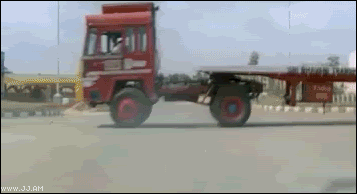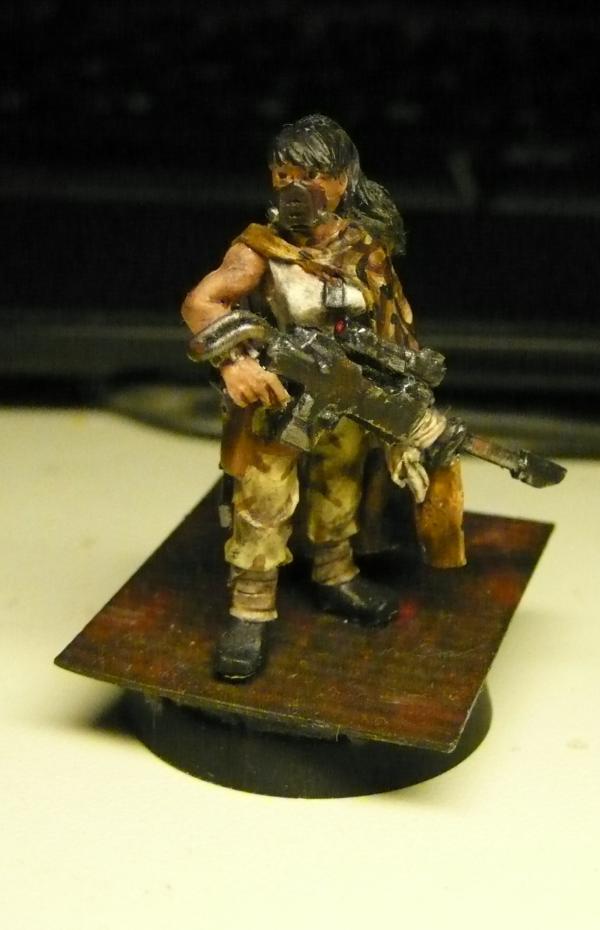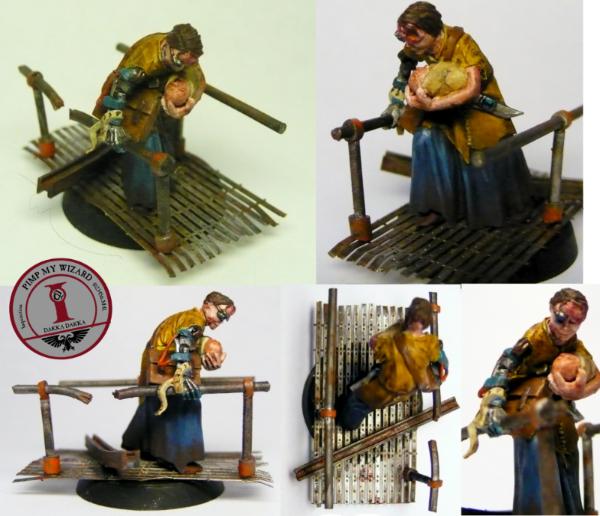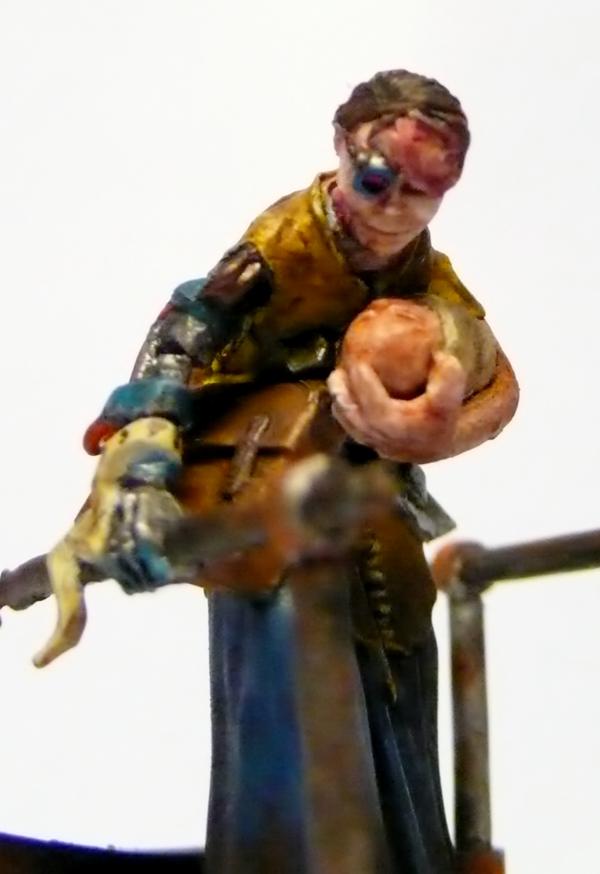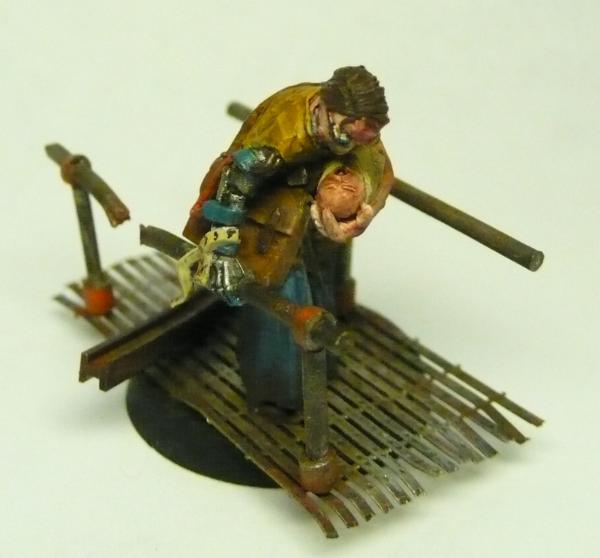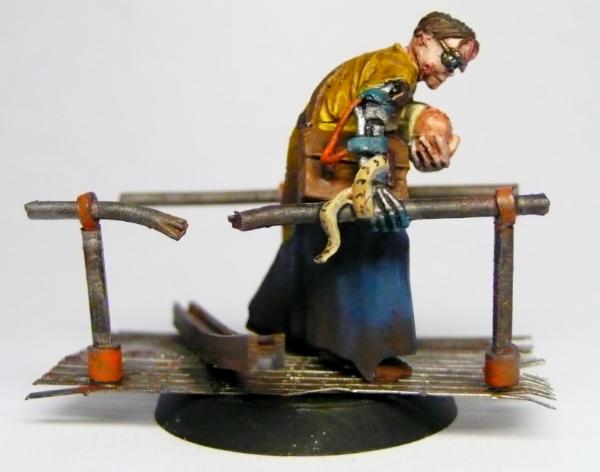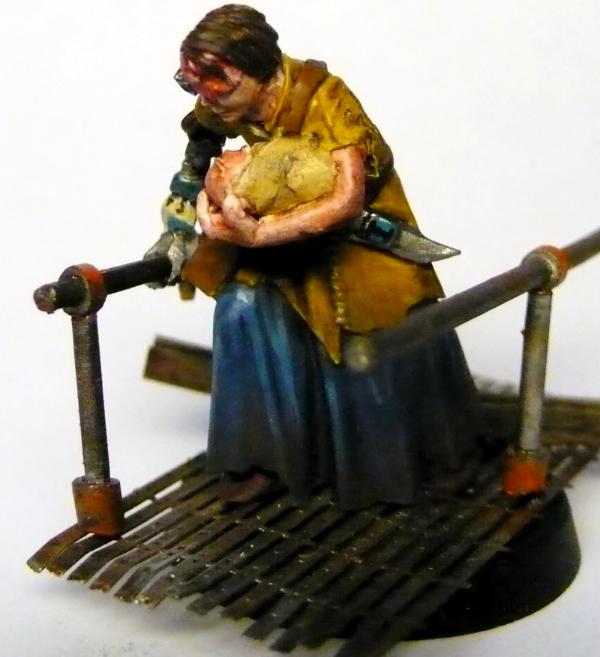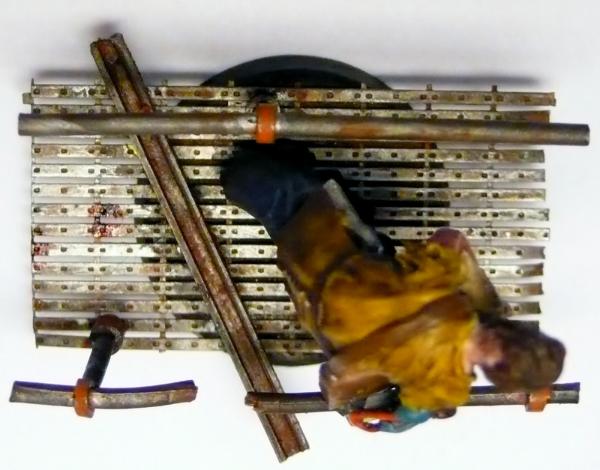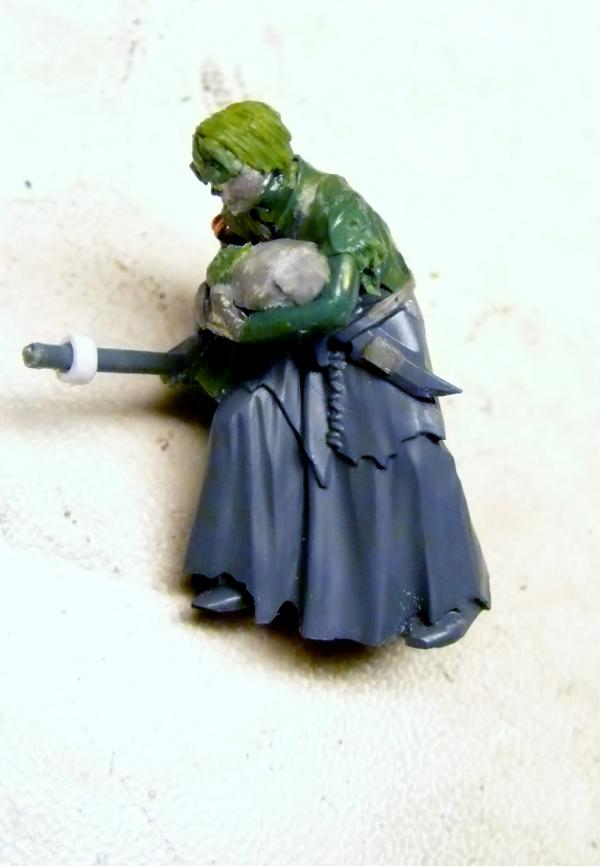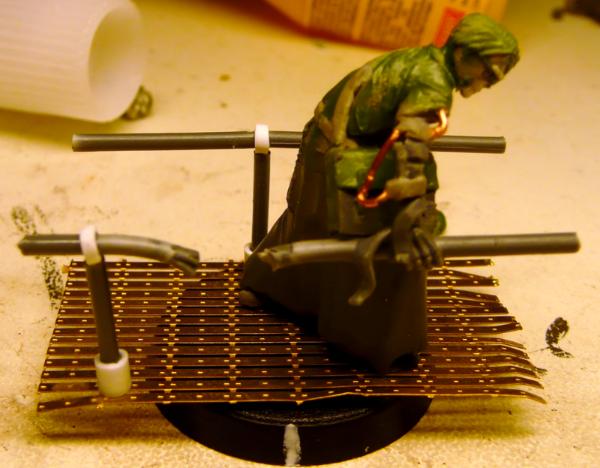Post by Scarper on Sept 6, 2011 10:55:17 GMT -5
Not the tigers! I've had bad experiences with those...
Sorry for the abscence - no real excuse, just been crazy busy with work (10hr shifts tend to leave little time for other things )
)
Thanks so so much for all the kind words and comments, I really really appreciate them, and I'm glad you guys are wanting more!
egon - The model is captain Jonas Murdoch from Privateer Press, with some DKOK GL arms and a crapton of greenstuff. Good eye, Beav!
@happyorange and Batou - Great to see you guys back! (He says, having not posted in months ) Thank you so much for the compliments - you're making me blush! My GS-fu is honestly nothing special - more 'lots of perseverance and ripping bits off' than skill!
) Thank you so much for the compliments - you're making me blush! My GS-fu is honestly nothing special - more 'lots of perseverance and ripping bits off' than skill!
@mgk - Thanks so much man, I really appreciate that. And nonsense, that fallout stuff you produced a while back was amazing. Can't remember if I commented on it or not, but it was really inspiring, and I may be stealing an idea or two
As to updates, here's a conglomeration post of everything I've done on the necro gang so far. I did have it all spoiler tagged, but then remembered that that doesn't work on this forum So here are the models first, and the fluff for each one relegated to the end. There's a lot of new fluff, and also a painted 'Scratch' in there somewhere if you want to take a look
So here are the models first, and the fluff for each one relegated to the end. There's a lot of new fluff, and also a painted 'Scratch' in there somewhere if you want to take a look 
TL;DR campaign fluff - Caitiff is a planet under imperial control that suffered an environmental disaster in the midst of a civil war. An evacuation was planned, but only a miniscule proportion of the planet's population were able to reach evacuation points. The planet now has no system of government and conditions are anarchic outside of several larger settlements. Much of the air on the surface is poisonous, though settlements have sprung up in pockets of clearer air, and hive cities with their own air filtration systems remain. Major factions include Ridgeway's Remnants - a small community originating from PDF remnants; the Quadring Accord - a group originating from prisons and penal legions and a few others. The Jackal cell detailed below (my gang) is affiliated with the Remnants. Hope you enjoy!
Info on the planet setting:
Caitiff is a medium-small temperate world on the outer southern fringe of Imperial-controlled space. Its population once stood at around 15bn, with several small hive cities containing the vast majority of the population. Its income and value to the Imperium came from a rich supply of rusinate below its surface, a material essential in the production of, among other things, bolter cartridges, temperature regulation cells and in the refinement of various mineral ores. For several hundred years after its reintegration, Caitiff prospered – a bolstered economy, protection and trade with newly contacted Imperial fleets produced a new upper class of self-made industrialists and traders.
As stocks of rusinate dwindled, however, so too did Caitiff’s value to the Imperium. With a small population and little other minerals of value, the off-world contact and trade that had been the life blood of the new Caitiff slowly ebbed away. The economy suffered, and rising food prices and increasingly squalid living conditions kicked off a process of grumbling unrest among the working classes of Caitiff’s larger cities. The planetary governor at the time, Dyran Lavenne, was a corrupt bureaucrat widely recognised to be in the pocket of various industry moguls, and little to no relief effort occurred. Food riots in Rookpoint Spire and The Point were met with live fire from PDF forces, and an increasingly brutal arbite force enforced draconian ‘austerity laws’, leading to the disappearance of many dissenters. Civil war seemed a certainty. A number of popular resistance groups arose, and a pattern of ‘liberated’ population centres being mercilessly retaken by government forces began to emerge. Civilian casualties numbered in the hundreds of thousands, but it was only when several companies of the PDF defected to the rebel cause that the rebellion became a real and credible threat. Reports of executions and massacres on both sides could not be verified.
The downfall of the government of Caitiff didn’t come through military action, however, but through accident, poor construction and bad luck. The last hive city to spring up on Caitiff was different from the others. Over hundreds of years as the previous cities had grown, councils had been elected to ensure adequate ventilation, constant power and water supply, and structural integrity of the spire itself. Most of these councils were hereditary positions, chosen from the educated and wealthy elite. Some were benevolent, some self-interested, but all ensured the safe growth of their cities, both in height and spread. Easthollow, however, was in essence a vertical shantytown, a swaying and ever-expanding structure that sprang up over less than fifty years. It was composed entirely of the dwellings, both official and makeshift, of workers employed at the hundreds of vast rusinate refineries that made up the hive city’s base, and whilst an Easthollow council did exist, its members were hand-picked by the plant owners. At every turn, the council made concessions in the name of ‘austerity’, pocketing the funds that went unspent. A looming tower of plasteel, corrugated metal and scavenged building materials, housing a workforce of labourers widely considered disposable, run and maintained by a panel of corrupt and uninterested industrialists. It was a miracle that the hive stood as long as it did.
It’s unclear exactly what happened on the day that Easthollow collapsed, and survivor’s accounts are few and far between. It’s known that the ventilation system for one area of the hive was damaged in a wilful act of sabotage by a small rebel cell, though it’s unlikely that they were fully aware of what kind of chain reaction they were setting into motion. As their bomb, fashioned from stolen mining and factory equipment, exploded, Sector 12, location of one of the largest reactors powering the spire, lost both atmosphere and temperature regulation. The fires that started in the sector should have been stopped by auto-regulated flooding systems put in place to protect the lives of the inhabitants in such an emergency, but these never engaged, even as the fires spread into the power plant itself. Immense explosions ripped through the facility, containment domes failing and contingency measures overcome. It is likely that the colossal supporting beams housed in the area collapsed or melted in the intense heat, bringing entire layers of the hive down with them. The sudden and immense pressure on a single quadrant of a structure already weakened by cheap materials and years of poor maintenance proved too much to bear, and in less than an hour, the hive tore itself apart.
Refinement of rusinate is not a clean process. Several of the by-products produced are toxic to both plant and animal life even in miniscule amounts, and many of the radioactive elements have a half-life of thousands of years. Official policy required all waste from the process to be shipped off-world as soon as it was produced, and conveyed to planets designated ‘dead’ for long-term storage. This course of action was, of course, highly expensive, and many unscrupulous plant owners had taken to storing waste on site until such a quantity had been produced for a more efficient round trip. This efficiency measure proved disastrous with the collapse of Easthollow hive, and millions of tons of untreated industrial waste escaped into the atmosphere.
In the weeks following the incident at Easthollow, it became quickly apparent as the death toll rose that there was no containing the environmental pollutants, even if the various warring factions could put aside their differences long enough to enact a plan. Evacuation of ‘loyal citizens’ of the planet was organised by the planetary government, but woefully few evacuation centres were arranged, and rebel blockades, rioting, and bandit roadblocks made travel all but impossible. It is estimated that of the entire population, less than 1 million people were on board when the evacuation ships left for good.
The current story on Caitiff takes place fifteen years after the ‘evacuation’, and the planet is a very different place. The air on the surface itself is poisonous, though microclimate and uneven spread of the toxins from Easthollow results in wide variation - small pockets of more hospitable land exist, whereas the radiation in some areas would kill a man within hours. The atmosphere has thinned, and water vapour is scarce, resulting in sweltering days and freezing nights. Plant life, too, has been all but extinguished on the surface, and sprawling cities stand empty and abandoned – almost all surviving humans live in the vast hives, where filtration systems ensure relatively clean air to breathe. Humanity still thrives, adapting as it always has, and small, self-governing settlements exist throughout the world. Supply leads to wealth, and the settlements near clean water or functioning manufactorums quickly grew in power. With no central government, though, war and conflict are constant. Manufacture still takes place, though with no off-world interest raw materials are scarce. Scavengers pick through the corpses of the old world for technology that can no longer be reproduced, or simply materials or product that would be useful to surviving communities. This work is lucrative, but dangerous – many a team of fully equipped soldiers has failed to return from relatively simple pick-ups. Hardier creatures still stalk the surface – wiry, venomous nightmares that occasionally find their way into the deeper depths of the towering cities. Outside of the rudimentary justice system of the settlements, anarchy reigns, and gangs of murderous outlaws and bandits control vast swathes of the surface. Dark rumours persist of cannibalistic or mutated sects sweeping the land (always one continent over, or in an uncontactable hive); or of hive cities on the other side of the planet unaffected by the toxins, where crops still grow, the air is clear and clean water flows. The sensible take these stories for what they are. Life is hard on Caitiff, but, for better or worse, humanity prevails. [/i]
Info on Jackal cells:
Among the residents of Pinepoint, service is required for citizenship. Outsiders, paid in credits, alcohol or food, are hired for work, but military service is a requirement to stay within the relatively safe and desirable Remnant settlements. Ridgeway was criticised harshly for the introduction of this system, but he called for realism among his people – there simply were not the resources or room to shelter everyone who came begging. Despite this, he relented, saying that those too weak or ill to serve could also be sheltered provided another within their group would serve double time to take their place.
Newcomers wishing for full citizenship in Pinepoint or one of the smaller Remnant settlements had two options – work with Ridgeway’s Remnants themselves, or service in a Jackal team. The Remnants were a form of defence force and military police. Once given brief training, they would carry out local patrols outside the settlement, settle disputes between citizens, and form the only line of defence should the settlement be attacked. They were reasonably well equipped, with each ‘volunteer’ issued a rifle and armour from the remaining PDF stockpile, to be returned at the end of their service. Whether this equipment was still functional was another question. The minimum service within a Remnant squad is one year, though many stay longer than this. With steady (though meagre) pay, free equipment, and a relatively stable lifestyle, service in the Remnants is seen by many as a great way to live.
For those wishing to finish their service sooner, give something back to the community, or simply the poor misguided souls bored with life in the settlement and seeking adventure, joining a Jackal cell is an alternative option. Usually led by a veteran of the PDF, Jackals receive no training, no equipment and have no official instructions. There is no fixed term on service within a Jackal cell, but the cell is dissolved once it is judged to have acquired a resource of “significant value” to the settlement itself. The Jackal cells are usually a ragtag group with scavenged or homemade weapons and armour, and many have not returned after leaving the safety of Pinepoint. Others have forged trade routes with other settlements, discovered large caches of fuel or medical equipment in the wastes, or travelled to old military bases to pick through the broken equipment left behind. Some have been rumoured to have sacked other settlements for the resources they own. No questions are asked as to how the gain was made, but those proven to have stolen or murdered face the full force of Remnant justice. Any weapons and equipment that a Jackal may come across during their service is theirs to keep. Service with a Jackal cell is seen as a quicker way to gain citizenship in Pinepoint itself, but few are fully aware of the dangers that they face when they sign up.
Murdock
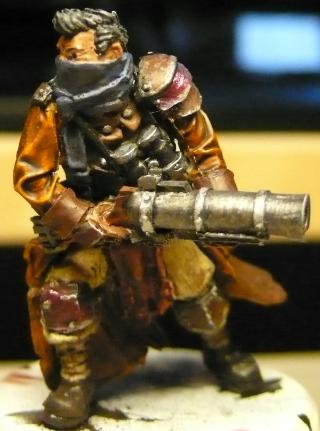
Leader of this Jackal cell. Claims to have been a sergeant in the PDF, but carries a lot of ‘non-standard’ equipment. He has spent many years on the scavenger teams training new recruits in the Remnants, far more than his required service. If asked, he tells people that it’s because he upset a high ranking officer in the Remnant forces themselves, but many other stories are told. Some believe that he hates Pinepoint, and will do anything to leave it. Others have suggested that he is fighting to his death, his only means to reunite with a family killed in the rebellion. Others, perhaps more realistically, have wondered if he simply enjoys the work. Whatever the suggestion, put forward to Murdock it results in scorn and hard labour. Often brusque and unfriendly, he will nonetheless go out of his way to protect those under him. Trinkets or alcohol have often appeared in the packs of his cell members after an excursion to trading posts, but Murdock denies all knowledge of this. He recently suffered a serious head wound after a blast knocked him from a window during a skirmish with some local outlaws. He recovered well, but Murdock's reactions and instructions have since seemed slower during combat situations.
Farrell
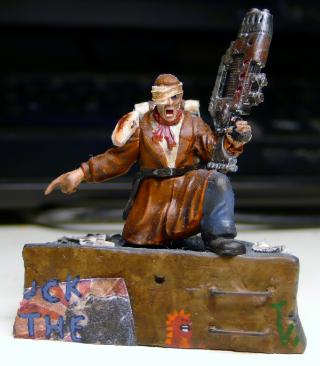
Medic and plasma gunner. Farrell was found in the wastes a mile outside of Rukob, bleeding badly from embedded buckshot and a (clumsily stitched) stab wound to the stomach. He was carrying an infant girl, unharmed, but with a strange symmetrical birthmark on her back. Both were carried back to Pinepoint, the largest Remnant settlement. His wounds were infected, and the fever almost killed him as he raved about mutants and monsters. As he recovered, he first asked about the girl, then about others who may have come after him. The medical staff became concerned that he may have a bounty on his head. Many of the Remnants don’t trust him, and from his strange arrival to his refusal to explain where he came from, he didn't help himself. The plasma weapon he carried was also a rare find, unusual to see outside the slaver camps to the North. Leaving the girl in the safety of the camp, he joined a Jackal team to pay back the kindness he was given, believing that his skill with medicae and especially his work with bionics (again, an unusual skill in the underhive) would prove invaluable. Friendly and jovial when spoken to, Farrell was nonetheless rather quiet, with a tendency to stare into space and tune out of conversations. He was most vocal when discussing his frustration at the lack of medical equipment available – there was nothing on the planet, he said, more heartbreaking than knowing exactly what was wrong with a man and being able to do nothing to fix it. He regularly wrote notes in a small book, telling any who asked that it was a diary. Convinced that that he was a spy for the QA, Twitch stole his book and handed it to Murdock. Whilst he did write detailed notes of his own activities, almost the entirety of Farrell’s book was filled with letters to a particular woman, none of which it appeared had actually been sent. Murdock spoke to him about it, but saw no reason for concern. Farrell went missing following a series of engagements with an offworld private security company, and is presumed dead or captured.
Skragg
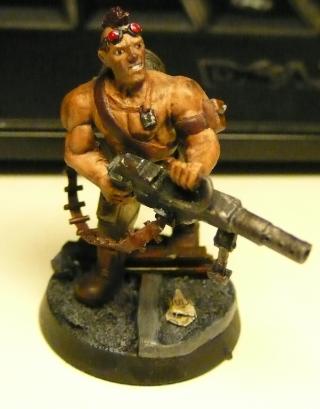
Heavy weapons enthusiast and inventor. Apparently mute, but adept at rigging technology from scrap, Murdock considers Skragg an idiot savant. Many of the others in the team think his silence is not a result of lack of intelligence, but rather a conscious choice. He had a close relationship with a younger Jackal named Scout, who was killed early in the campaign while the pair of them rescued Blind from rising floodwaters. Extended fluff story in the spoiler below. Skragg’s hearing has suffered as a result of his fondness for loud weaponry.
Blind
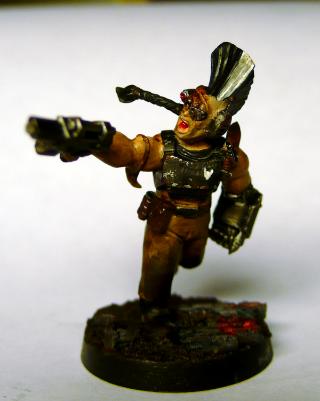
Whilst working as a gun for hire and going by the trade name of 'Jackdaw', Blind was hired with his mercenary partners by a power-armoured off worlder to retrieve a unique power cell he believed to be located in a subterranean section of the hive. After discovering that the factory had already been looted by Murdock's Jackal cell, Blind contacted RiffRaff, an old friend with whom he had once worked a caravan route, to arrange a trade. When they met for the handover, the stranger's men sprang a trap, blowing a resevoir dome and causing the area to flood with water. Blind was badly injured in the initial explosion, but was carried to safety by Skragg and Scout as many others drowned. After Murdock sold Blind's equipment to pay for medical supplies and bionic replacements, he joined the cell, with few other places to go. Gruff and unfriendly to strangers, Blind feels most at home with other professional soldiers and often seeks out the company of bounty hunters and other hired guns.
Crow
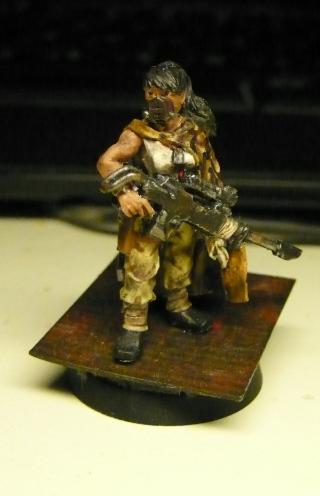
Before finding the Remnants, Crow scavenged the rocky and mountainous wastes outside the hive with her brother, who had raised her since they became separated from their parents during the Evac. After serving several months as a construction worker in the compound, Crow volunteered to join a Jackal team to rediscover the adventure and excitement of living rough. She may or may not regret her decision. Agile and sure-footed, Crow tends to stay high above the hive floor, shooting from vantage points wherever possible. She is good humoured and friendly, though with rather a dark sense of humour. She rarely takes off her rebreather, pointing out the very real danger that surface pollutants pose to the lungs. When pressed (or after a little too much wildsnake), she may relate the fate of her brother, who suffered worsening breathing problems on the surface. A few days prior to Crow’s discovery by a Remnant patrol, he left their camp in the middle of the night and shot himself without a word. He had complained over their campfire that his laboured breathing was slowing them both down, and one day waiting for him might get her killed. She had brushed him off, joking about carrying him. To this day, she resents his choice to make the decision without her, forcing her to carry on alone.
Ferret
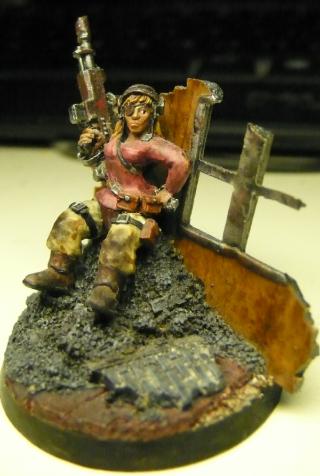
Joined the Remnants after being caught attempting to steal food from the Pinepoint stores with her teenage son. Both agreed to serve in Jackal teams and eventually join defensive patrols if it meant access to the compound. Before the evacuation, Ferret worked as a teacher, educating the upper classes in Caitiff history, and the value of their contact with the Imperium. She was forcibly conscripted by the Eurata Separatist Front once the rebellion began, and served several years in a guerrilla unit. Ferret is very fast and a reasonable shot, but has been injured several times whilst in the 21st. Keen to return to base, Ferret rarely socialises, but will scavenge during her own time, hoping to find some archeotech valuable enough to merit a return to Pinepoint, and the peaceful existence that she longs for.
Riggs
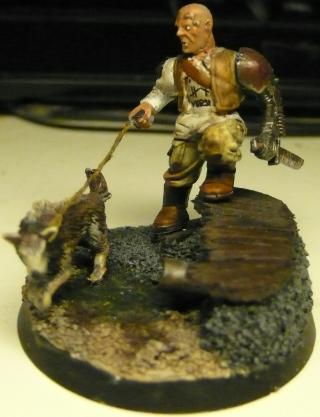
Friendly and affable, Riggs was born inside the Remnant compound. Initially charged with sump-farming and looking after the animals, he joined a Jackal team as soon as he could, and acts as a friendly second-in-command to Murdock. Despite his affable demeanour, Riggs has a natural gift for negotiation and persuasion, and often accompanies Murdock to trading posts or to form treaties with rival groups. He tends to know a lot of residents in the settlements they regularly visit, and takes care of the team’s dogs, Loki and Cass. Riggs was badly wounded and one of his dogs killed by an unknown animal during a scavenging excursion on the surface. Farrell fitted him with a bionic replacement taken from the remaining PDF supplies.
Coop and RiffRaff

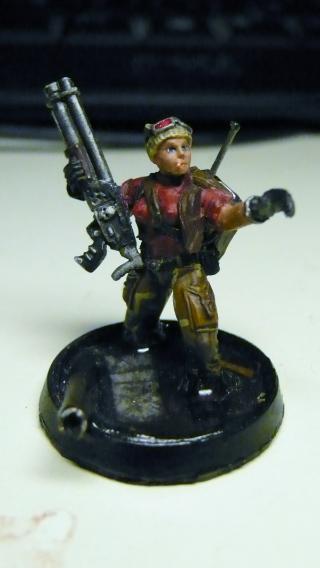
An ex-penal legionnaire with a history of forced service with the QA, and a once-wealthy runaway who served with a trade caravan specialising in electronics. Coop and Riff sold their services as caravan guards together for several years before meeting Murdock with his previous Jackal cell. Tired of life on the roads, they planned to complete their time in the Jackals and acquire citizenship in Pinepoint, where they could live peacefully. RiffRaff knits (badly), and Coop has been known to decorate buildings where the Jackals camp with vast, spray-painted murals. The two were inseparable, and a few fluff stories are under the cut. During the campaign, RiffRaff drowned in an engagement with the QA. Coop continues to serve with the Jackals, acting as a kind of carer to Twitch but he has developed several self-destructive tendencies, and has not recovered from her loss. He fights with a jerry-rigged flame-thrower created by Skragg, and since Riff’s death, he has been known to become frenzied and uncontrollable when engaging other gangs.
Twitch
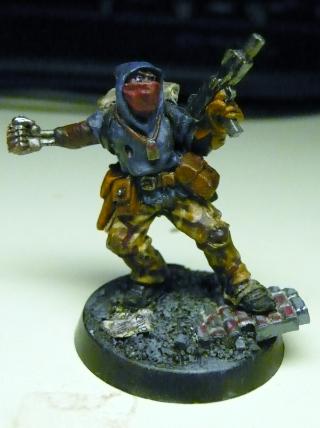
A close friend of RiffRaff and Coop, Twitch worked with them for several years as a caravan guard. Somewhat of a heavy drinker with a talent with cards and a fast mouth, he was known as a story-teller and writer. Around a year before the three came into contact with Murdock, though, he was thrown from his truck in a collision with some local wildlife, striking his head against the road. Whilst he survived, he has been wildly unpredictable since, breaking down into tears with no provocation or attacking strangers over imagined slights. Despite this, he still experiences periods of lucidity, and can for days at a time seem the man he used to be. Whilst most men in such situations would not have lasted long, Riff and Coop stuck by their old friend, even though his outbursts cost them several contracts. Murdock was not happy with his inclusion in the Jackals, but allowed him to remain, as long as the others accepted responsibility for his behaviour.
Scratch
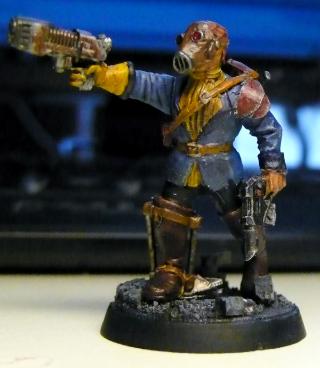
At 19, Scratch is the youngest member of the 21st Jackals. Optimistic and adventurous, she spends as much time on the surface as she can, and adores the ruins. Scratch had no real experience of the world before the Easthollow disaster, and was carried to Pinepoint shortly after the evac by her parents, both of whom have since passed (her father of rusinate lung, her mother of radiation sickness while serving with the Remnants). She was raised mostly be Elara, another orphan girl discovered by Remnant patrols shortly before her arrival, and the two are very close. Scratch revels in finding what she can of life before, and has developed a penchant for old world luxuries – she has spent many an evening with a begrudging Elara combing old stores for lho sticks, soda and sour candy. She also delights in finding gifts for others, hunting out undamaged spray-paints for Coop and Riff, or interesting mechanical parts and wiring for Skragg.
Originally from the poorer quarters around Rookpoint Spire, Scratch’s parents had little money for medical care, and her birth was complicated. She suffered a nerve injury to her right leg, leading to complete loss of sensation that led to multiple fractures and injuries as she grew. Though it does little to slow her down, pain and fatigue quickly set in if walking longer distances and Scratch is loathe to admit this, pressing through the pain for as long as she can. She learned to drive at a young age and has developed some skill, often being entrusted with the truck by Murdock on their expeditions outside of the hive.
Sorry for the abscence - no real excuse, just been crazy busy with work (10hr shifts tend to leave little time for other things
 )
)Thanks so so much for all the kind words and comments, I really really appreciate them, and I'm glad you guys are wanting more!
egon - The model is captain Jonas Murdoch from Privateer Press, with some DKOK GL arms and a crapton of greenstuff. Good eye, Beav!
@happyorange and Batou - Great to see you guys back! (He says, having not posted in months
 ) Thank you so much for the compliments - you're making me blush! My GS-fu is honestly nothing special - more 'lots of perseverance and ripping bits off' than skill!
) Thank you so much for the compliments - you're making me blush! My GS-fu is honestly nothing special - more 'lots of perseverance and ripping bits off' than skill!@mgk - Thanks so much man, I really appreciate that. And nonsense, that fallout stuff you produced a while back was amazing. Can't remember if I commented on it or not, but it was really inspiring, and I may be stealing an idea or two

As to updates, here's a conglomeration post of everything I've done on the necro gang so far. I did have it all spoiler tagged, but then remembered that that doesn't work on this forum
 So here are the models first, and the fluff for each one relegated to the end. There's a lot of new fluff, and also a painted 'Scratch' in there somewhere if you want to take a look
So here are the models first, and the fluff for each one relegated to the end. There's a lot of new fluff, and also a painted 'Scratch' in there somewhere if you want to take a look 
TL;DR campaign fluff - Caitiff is a planet under imperial control that suffered an environmental disaster in the midst of a civil war. An evacuation was planned, but only a miniscule proportion of the planet's population were able to reach evacuation points. The planet now has no system of government and conditions are anarchic outside of several larger settlements. Much of the air on the surface is poisonous, though settlements have sprung up in pockets of clearer air, and hive cities with their own air filtration systems remain. Major factions include Ridgeway's Remnants - a small community originating from PDF remnants; the Quadring Accord - a group originating from prisons and penal legions and a few others. The Jackal cell detailed below (my gang) is affiliated with the Remnants. Hope you enjoy!
Info on the planet setting:
Caitiff is a medium-small temperate world on the outer southern fringe of Imperial-controlled space. Its population once stood at around 15bn, with several small hive cities containing the vast majority of the population. Its income and value to the Imperium came from a rich supply of rusinate below its surface, a material essential in the production of, among other things, bolter cartridges, temperature regulation cells and in the refinement of various mineral ores. For several hundred years after its reintegration, Caitiff prospered – a bolstered economy, protection and trade with newly contacted Imperial fleets produced a new upper class of self-made industrialists and traders.
As stocks of rusinate dwindled, however, so too did Caitiff’s value to the Imperium. With a small population and little other minerals of value, the off-world contact and trade that had been the life blood of the new Caitiff slowly ebbed away. The economy suffered, and rising food prices and increasingly squalid living conditions kicked off a process of grumbling unrest among the working classes of Caitiff’s larger cities. The planetary governor at the time, Dyran Lavenne, was a corrupt bureaucrat widely recognised to be in the pocket of various industry moguls, and little to no relief effort occurred. Food riots in Rookpoint Spire and The Point were met with live fire from PDF forces, and an increasingly brutal arbite force enforced draconian ‘austerity laws’, leading to the disappearance of many dissenters. Civil war seemed a certainty. A number of popular resistance groups arose, and a pattern of ‘liberated’ population centres being mercilessly retaken by government forces began to emerge. Civilian casualties numbered in the hundreds of thousands, but it was only when several companies of the PDF defected to the rebel cause that the rebellion became a real and credible threat. Reports of executions and massacres on both sides could not be verified.
The downfall of the government of Caitiff didn’t come through military action, however, but through accident, poor construction and bad luck. The last hive city to spring up on Caitiff was different from the others. Over hundreds of years as the previous cities had grown, councils had been elected to ensure adequate ventilation, constant power and water supply, and structural integrity of the spire itself. Most of these councils were hereditary positions, chosen from the educated and wealthy elite. Some were benevolent, some self-interested, but all ensured the safe growth of their cities, both in height and spread. Easthollow, however, was in essence a vertical shantytown, a swaying and ever-expanding structure that sprang up over less than fifty years. It was composed entirely of the dwellings, both official and makeshift, of workers employed at the hundreds of vast rusinate refineries that made up the hive city’s base, and whilst an Easthollow council did exist, its members were hand-picked by the plant owners. At every turn, the council made concessions in the name of ‘austerity’, pocketing the funds that went unspent. A looming tower of plasteel, corrugated metal and scavenged building materials, housing a workforce of labourers widely considered disposable, run and maintained by a panel of corrupt and uninterested industrialists. It was a miracle that the hive stood as long as it did.
It’s unclear exactly what happened on the day that Easthollow collapsed, and survivor’s accounts are few and far between. It’s known that the ventilation system for one area of the hive was damaged in a wilful act of sabotage by a small rebel cell, though it’s unlikely that they were fully aware of what kind of chain reaction they were setting into motion. As their bomb, fashioned from stolen mining and factory equipment, exploded, Sector 12, location of one of the largest reactors powering the spire, lost both atmosphere and temperature regulation. The fires that started in the sector should have been stopped by auto-regulated flooding systems put in place to protect the lives of the inhabitants in such an emergency, but these never engaged, even as the fires spread into the power plant itself. Immense explosions ripped through the facility, containment domes failing and contingency measures overcome. It is likely that the colossal supporting beams housed in the area collapsed or melted in the intense heat, bringing entire layers of the hive down with them. The sudden and immense pressure on a single quadrant of a structure already weakened by cheap materials and years of poor maintenance proved too much to bear, and in less than an hour, the hive tore itself apart.
Refinement of rusinate is not a clean process. Several of the by-products produced are toxic to both plant and animal life even in miniscule amounts, and many of the radioactive elements have a half-life of thousands of years. Official policy required all waste from the process to be shipped off-world as soon as it was produced, and conveyed to planets designated ‘dead’ for long-term storage. This course of action was, of course, highly expensive, and many unscrupulous plant owners had taken to storing waste on site until such a quantity had been produced for a more efficient round trip. This efficiency measure proved disastrous with the collapse of Easthollow hive, and millions of tons of untreated industrial waste escaped into the atmosphere.
In the weeks following the incident at Easthollow, it became quickly apparent as the death toll rose that there was no containing the environmental pollutants, even if the various warring factions could put aside their differences long enough to enact a plan. Evacuation of ‘loyal citizens’ of the planet was organised by the planetary government, but woefully few evacuation centres were arranged, and rebel blockades, rioting, and bandit roadblocks made travel all but impossible. It is estimated that of the entire population, less than 1 million people were on board when the evacuation ships left for good.
The current story on Caitiff takes place fifteen years after the ‘evacuation’, and the planet is a very different place. The air on the surface itself is poisonous, though microclimate and uneven spread of the toxins from Easthollow results in wide variation - small pockets of more hospitable land exist, whereas the radiation in some areas would kill a man within hours. The atmosphere has thinned, and water vapour is scarce, resulting in sweltering days and freezing nights. Plant life, too, has been all but extinguished on the surface, and sprawling cities stand empty and abandoned – almost all surviving humans live in the vast hives, where filtration systems ensure relatively clean air to breathe. Humanity still thrives, adapting as it always has, and small, self-governing settlements exist throughout the world. Supply leads to wealth, and the settlements near clean water or functioning manufactorums quickly grew in power. With no central government, though, war and conflict are constant. Manufacture still takes place, though with no off-world interest raw materials are scarce. Scavengers pick through the corpses of the old world for technology that can no longer be reproduced, or simply materials or product that would be useful to surviving communities. This work is lucrative, but dangerous – many a team of fully equipped soldiers has failed to return from relatively simple pick-ups. Hardier creatures still stalk the surface – wiry, venomous nightmares that occasionally find their way into the deeper depths of the towering cities. Outside of the rudimentary justice system of the settlements, anarchy reigns, and gangs of murderous outlaws and bandits control vast swathes of the surface. Dark rumours persist of cannibalistic or mutated sects sweeping the land (always one continent over, or in an uncontactable hive); or of hive cities on the other side of the planet unaffected by the toxins, where crops still grow, the air is clear and clean water flows. The sensible take these stories for what they are. Life is hard on Caitiff, but, for better or worse, humanity prevails. [/i]
Info on Jackal cells:
Among the residents of Pinepoint, service is required for citizenship. Outsiders, paid in credits, alcohol or food, are hired for work, but military service is a requirement to stay within the relatively safe and desirable Remnant settlements. Ridgeway was criticised harshly for the introduction of this system, but he called for realism among his people – there simply were not the resources or room to shelter everyone who came begging. Despite this, he relented, saying that those too weak or ill to serve could also be sheltered provided another within their group would serve double time to take their place.
Newcomers wishing for full citizenship in Pinepoint or one of the smaller Remnant settlements had two options – work with Ridgeway’s Remnants themselves, or service in a Jackal team. The Remnants were a form of defence force and military police. Once given brief training, they would carry out local patrols outside the settlement, settle disputes between citizens, and form the only line of defence should the settlement be attacked. They were reasonably well equipped, with each ‘volunteer’ issued a rifle and armour from the remaining PDF stockpile, to be returned at the end of their service. Whether this equipment was still functional was another question. The minimum service within a Remnant squad is one year, though many stay longer than this. With steady (though meagre) pay, free equipment, and a relatively stable lifestyle, service in the Remnants is seen by many as a great way to live.
For those wishing to finish their service sooner, give something back to the community, or simply the poor misguided souls bored with life in the settlement and seeking adventure, joining a Jackal cell is an alternative option. Usually led by a veteran of the PDF, Jackals receive no training, no equipment and have no official instructions. There is no fixed term on service within a Jackal cell, but the cell is dissolved once it is judged to have acquired a resource of “significant value” to the settlement itself. The Jackal cells are usually a ragtag group with scavenged or homemade weapons and armour, and many have not returned after leaving the safety of Pinepoint. Others have forged trade routes with other settlements, discovered large caches of fuel or medical equipment in the wastes, or travelled to old military bases to pick through the broken equipment left behind. Some have been rumoured to have sacked other settlements for the resources they own. No questions are asked as to how the gain was made, but those proven to have stolen or murdered face the full force of Remnant justice. Any weapons and equipment that a Jackal may come across during their service is theirs to keep. Service with a Jackal cell is seen as a quicker way to gain citizenship in Pinepoint itself, but few are fully aware of the dangers that they face when they sign up.
Murdock

Leader of this Jackal cell. Claims to have been a sergeant in the PDF, but carries a lot of ‘non-standard’ equipment. He has spent many years on the scavenger teams training new recruits in the Remnants, far more than his required service. If asked, he tells people that it’s because he upset a high ranking officer in the Remnant forces themselves, but many other stories are told. Some believe that he hates Pinepoint, and will do anything to leave it. Others have suggested that he is fighting to his death, his only means to reunite with a family killed in the rebellion. Others, perhaps more realistically, have wondered if he simply enjoys the work. Whatever the suggestion, put forward to Murdock it results in scorn and hard labour. Often brusque and unfriendly, he will nonetheless go out of his way to protect those under him. Trinkets or alcohol have often appeared in the packs of his cell members after an excursion to trading posts, but Murdock denies all knowledge of this. He recently suffered a serious head wound after a blast knocked him from a window during a skirmish with some local outlaws. He recovered well, but Murdock's reactions and instructions have since seemed slower during combat situations.
Farrell

Medic and plasma gunner. Farrell was found in the wastes a mile outside of Rukob, bleeding badly from embedded buckshot and a (clumsily stitched) stab wound to the stomach. He was carrying an infant girl, unharmed, but with a strange symmetrical birthmark on her back. Both were carried back to Pinepoint, the largest Remnant settlement. His wounds were infected, and the fever almost killed him as he raved about mutants and monsters. As he recovered, he first asked about the girl, then about others who may have come after him. The medical staff became concerned that he may have a bounty on his head. Many of the Remnants don’t trust him, and from his strange arrival to his refusal to explain where he came from, he didn't help himself. The plasma weapon he carried was also a rare find, unusual to see outside the slaver camps to the North. Leaving the girl in the safety of the camp, he joined a Jackal team to pay back the kindness he was given, believing that his skill with medicae and especially his work with bionics (again, an unusual skill in the underhive) would prove invaluable. Friendly and jovial when spoken to, Farrell was nonetheless rather quiet, with a tendency to stare into space and tune out of conversations. He was most vocal when discussing his frustration at the lack of medical equipment available – there was nothing on the planet, he said, more heartbreaking than knowing exactly what was wrong with a man and being able to do nothing to fix it. He regularly wrote notes in a small book, telling any who asked that it was a diary. Convinced that that he was a spy for the QA, Twitch stole his book and handed it to Murdock. Whilst he did write detailed notes of his own activities, almost the entirety of Farrell’s book was filled with letters to a particular woman, none of which it appeared had actually been sent. Murdock spoke to him about it, but saw no reason for concern. Farrell went missing following a series of engagements with an offworld private security company, and is presumed dead or captured.
Skragg

Heavy weapons enthusiast and inventor. Apparently mute, but adept at rigging technology from scrap, Murdock considers Skragg an idiot savant. Many of the others in the team think his silence is not a result of lack of intelligence, but rather a conscious choice. He had a close relationship with a younger Jackal named Scout, who was killed early in the campaign while the pair of them rescued Blind from rising floodwaters. Extended fluff story in the spoiler below. Skragg’s hearing has suffered as a result of his fondness for loud weaponry.
Blind

Whilst working as a gun for hire and going by the trade name of 'Jackdaw', Blind was hired with his mercenary partners by a power-armoured off worlder to retrieve a unique power cell he believed to be located in a subterranean section of the hive. After discovering that the factory had already been looted by Murdock's Jackal cell, Blind contacted RiffRaff, an old friend with whom he had once worked a caravan route, to arrange a trade. When they met for the handover, the stranger's men sprang a trap, blowing a resevoir dome and causing the area to flood with water. Blind was badly injured in the initial explosion, but was carried to safety by Skragg and Scout as many others drowned. After Murdock sold Blind's equipment to pay for medical supplies and bionic replacements, he joined the cell, with few other places to go. Gruff and unfriendly to strangers, Blind feels most at home with other professional soldiers and often seeks out the company of bounty hunters and other hired guns.
Crow

Before finding the Remnants, Crow scavenged the rocky and mountainous wastes outside the hive with her brother, who had raised her since they became separated from their parents during the Evac. After serving several months as a construction worker in the compound, Crow volunteered to join a Jackal team to rediscover the adventure and excitement of living rough. She may or may not regret her decision. Agile and sure-footed, Crow tends to stay high above the hive floor, shooting from vantage points wherever possible. She is good humoured and friendly, though with rather a dark sense of humour. She rarely takes off her rebreather, pointing out the very real danger that surface pollutants pose to the lungs. When pressed (or after a little too much wildsnake), she may relate the fate of her brother, who suffered worsening breathing problems on the surface. A few days prior to Crow’s discovery by a Remnant patrol, he left their camp in the middle of the night and shot himself without a word. He had complained over their campfire that his laboured breathing was slowing them both down, and one day waiting for him might get her killed. She had brushed him off, joking about carrying him. To this day, she resents his choice to make the decision without her, forcing her to carry on alone.
Ferret

Joined the Remnants after being caught attempting to steal food from the Pinepoint stores with her teenage son. Both agreed to serve in Jackal teams and eventually join defensive patrols if it meant access to the compound. Before the evacuation, Ferret worked as a teacher, educating the upper classes in Caitiff history, and the value of their contact with the Imperium. She was forcibly conscripted by the Eurata Separatist Front once the rebellion began, and served several years in a guerrilla unit. Ferret is very fast and a reasonable shot, but has been injured several times whilst in the 21st. Keen to return to base, Ferret rarely socialises, but will scavenge during her own time, hoping to find some archeotech valuable enough to merit a return to Pinepoint, and the peaceful existence that she longs for.
Riggs

Friendly and affable, Riggs was born inside the Remnant compound. Initially charged with sump-farming and looking after the animals, he joined a Jackal team as soon as he could, and acts as a friendly second-in-command to Murdock. Despite his affable demeanour, Riggs has a natural gift for negotiation and persuasion, and often accompanies Murdock to trading posts or to form treaties with rival groups. He tends to know a lot of residents in the settlements they regularly visit, and takes care of the team’s dogs, Loki and Cass. Riggs was badly wounded and one of his dogs killed by an unknown animal during a scavenging excursion on the surface. Farrell fitted him with a bionic replacement taken from the remaining PDF supplies.
Coop and RiffRaff


An ex-penal legionnaire with a history of forced service with the QA, and a once-wealthy runaway who served with a trade caravan specialising in electronics. Coop and Riff sold their services as caravan guards together for several years before meeting Murdock with his previous Jackal cell. Tired of life on the roads, they planned to complete their time in the Jackals and acquire citizenship in Pinepoint, where they could live peacefully. RiffRaff knits (badly), and Coop has been known to decorate buildings where the Jackals camp with vast, spray-painted murals. The two were inseparable, and a few fluff stories are under the cut. During the campaign, RiffRaff drowned in an engagement with the QA. Coop continues to serve with the Jackals, acting as a kind of carer to Twitch but he has developed several self-destructive tendencies, and has not recovered from her loss. He fights with a jerry-rigged flame-thrower created by Skragg, and since Riff’s death, he has been known to become frenzied and uncontrollable when engaging other gangs.
Twitch

A close friend of RiffRaff and Coop, Twitch worked with them for several years as a caravan guard. Somewhat of a heavy drinker with a talent with cards and a fast mouth, he was known as a story-teller and writer. Around a year before the three came into contact with Murdock, though, he was thrown from his truck in a collision with some local wildlife, striking his head against the road. Whilst he survived, he has been wildly unpredictable since, breaking down into tears with no provocation or attacking strangers over imagined slights. Despite this, he still experiences periods of lucidity, and can for days at a time seem the man he used to be. Whilst most men in such situations would not have lasted long, Riff and Coop stuck by their old friend, even though his outbursts cost them several contracts. Murdock was not happy with his inclusion in the Jackals, but allowed him to remain, as long as the others accepted responsibility for his behaviour.
Scratch

At 19, Scratch is the youngest member of the 21st Jackals. Optimistic and adventurous, she spends as much time on the surface as she can, and adores the ruins. Scratch had no real experience of the world before the Easthollow disaster, and was carried to Pinepoint shortly after the evac by her parents, both of whom have since passed (her father of rusinate lung, her mother of radiation sickness while serving with the Remnants). She was raised mostly be Elara, another orphan girl discovered by Remnant patrols shortly before her arrival, and the two are very close. Scratch revels in finding what she can of life before, and has developed a penchant for old world luxuries – she has spent many an evening with a begrudging Elara combing old stores for lho sticks, soda and sour candy. She also delights in finding gifts for others, hunting out undamaged spray-paints for Coop and Riff, or interesting mechanical parts and wiring for Skragg.
Originally from the poorer quarters around Rookpoint Spire, Scratch’s parents had little money for medical care, and her birth was complicated. She suffered a nerve injury to her right leg, leading to complete loss of sensation that led to multiple fractures and injuries as she grew. Though it does little to slow her down, pain and fatigue quickly set in if walking longer distances and Scratch is loathe to admit this, pressing through the pain for as long as she can. She learned to drive at a young age and has developed some skill, often being entrusted with the truck by Murdock on their expeditions outside of the hive.

